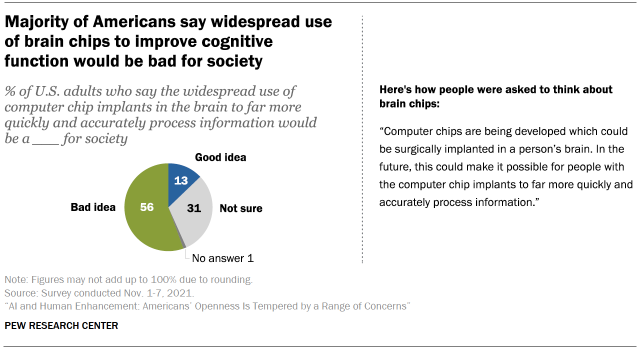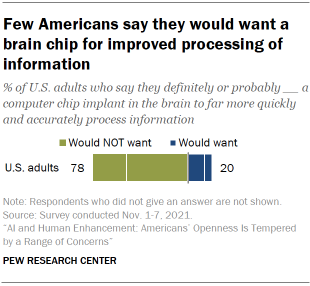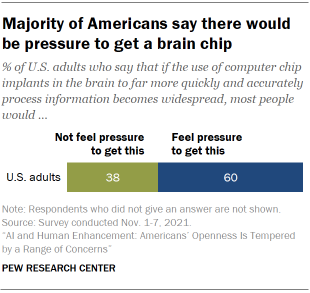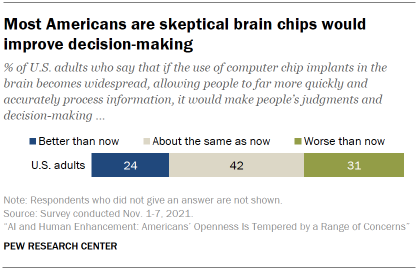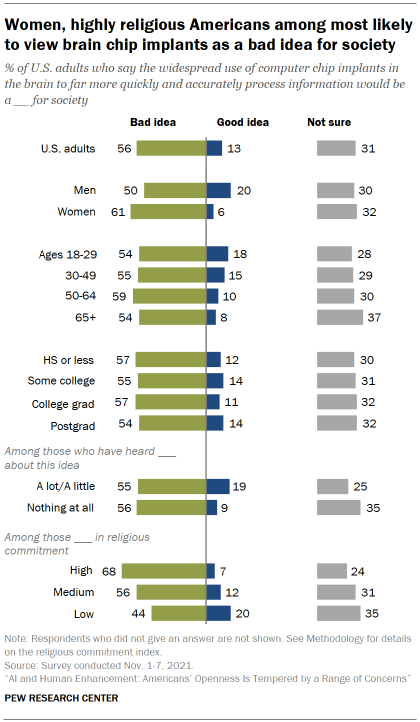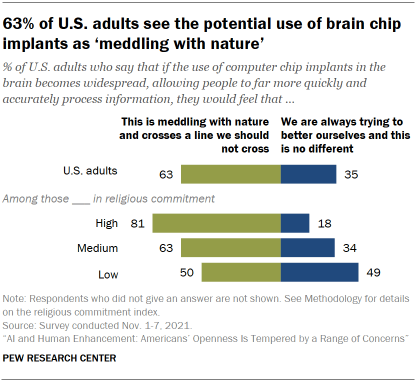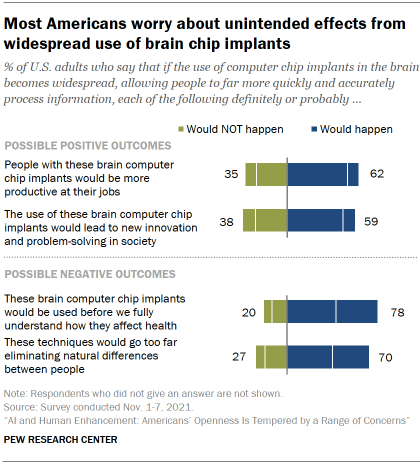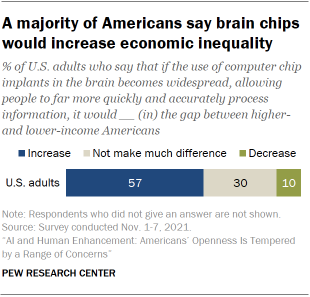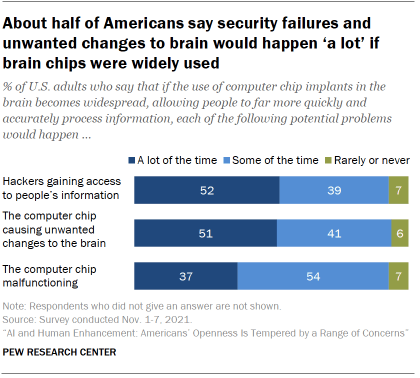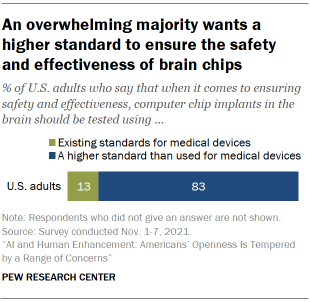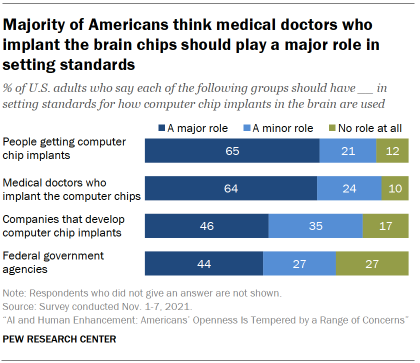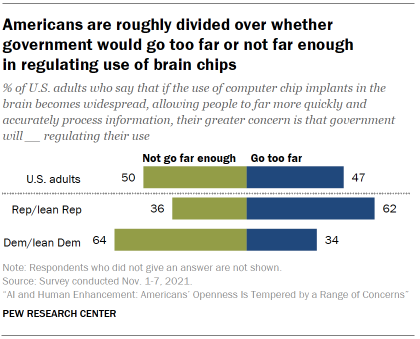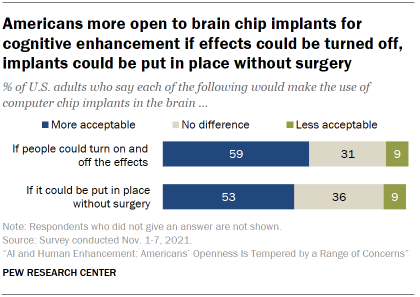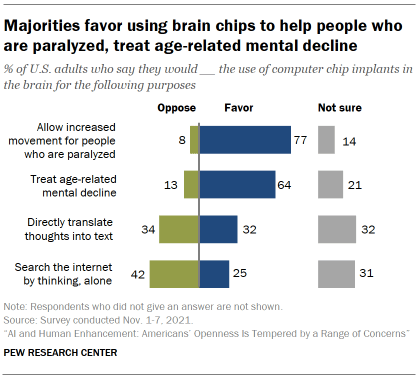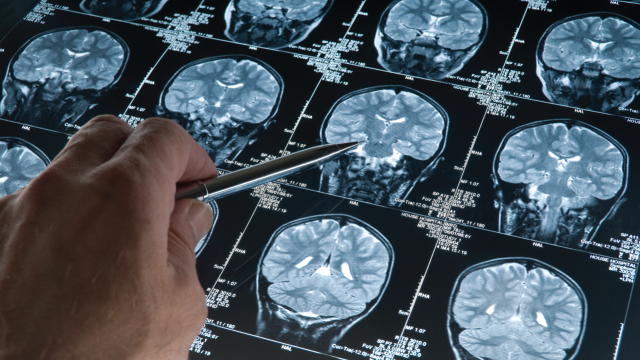
The idea of computer chip implants in the brain may seem futuristic to some, but this development could be widely available in the years to come. At this early stage of development, Americans are generally negative toward the idea of widespread use of computer chip implants in the brain to enhance cognitive function, and few say they would want this for themselves.
Devices that interface with the neural system are currently in use and development only for those with a therapeutic need. For instance, cochlear implants are used to help people with hearing difficulties. And some patients with Parkinson’s disease have a device implanted in their brain to send electrical pulses that control tremors and improve motor control.
Medical researchers and device developers aim to use brain chip implants to help people with paralysis. Researchers at Ohio State University and Battelle Memorial Institute have used brain implants to help restore hand movement and a sense of touch in patients with severe spinal cord injuries. And a brain implant was recently used to translate the thoughts of a patient with a severe spinal cord injury into text with a very high degree of accuracy.
One future use of brain chip implants could be to augment brain functioning for people even without therapeutic need. By 56% to 13%, far more U.S. adults say the widespread use of computer chip implants in the brain to more quickly and accurately process information would be a bad idea than good idea for society; 31% say they are not sure if this would be a good or bad idea for society.
Americans express limited desire for a computer chip brain implant for themselves: 78% say they would not want a computer chip implant that would allow them to better process information if it were available to them. Just 20% say they would want this.
A 2016 Center survey asked about the idea of using brain chip implants to enhance cognitive function using a similar though not identical description. Five years ago, most Americans were also largely wary of this possibility. Two-thirds thought they would not want a surgically implanted brain chip for a “much improved ability to concentrate and process information.” And more Americans said they were at least somewhat worried about this possibility than said they were enthusiastic about the idea.
Even so, the new survey finds six-in-ten U.S. adults think that if brain chip use became widespread, most people would feel pressure to get an implant. A smaller share (38%) thinks most people would not feel pressure to get this.
One factor in these negative reactions: Most Americans are skeptical that widespread use of brain chips would improve people’s judgment and decision-making. Just 24% say the widespread use of brain chip implants to improve cognitive function would make people’s decision-making better. A much larger share says it would either make people’s judgment and decision-making worse (31%) or that it would be about the same as now (42%).
Negative views of using brain chip implants for enhancement are common across demographic groups
Limited enthusiasm for the widespread use of brain chip implants can be seen across demographic groups, with small shares saying this would be a good idea for society.
Men are somewhat more favorable about this idea than women. Among women, 61% say computer chip implants in the brain would be a bad idea for society, while just 6% say it would be a good idea. The balance of opinion tilts in the same direction among men, but by a somewhat narrower margin (50% see it as a bad idea vs. 20% good idea).
Just 5% of Americans say they have heard a lot and 32% a little about this idea. This group leans strongly to the viewpoint that this would be a bad rather than a good idea for society (55% vs. 19% saying good idea). Another quarter of this group say they are not sure.
Religion also plays a role in views about this idea. People with a high level of religious commitment (based on a three-item index of religious importance, frequency of religious service attendance and frequency of prayer) say widespread use of computer chip implants in the brain would be a bad idea for society by an overwhelming margin (68% to 7%). By comparison, 44% of those low in religious commitment say this would be a bad idea for society, while 20% say it would be a good idea and 35% say they’re not sure.
Differences are also seen in the degree to which men and women, those more and less familiar with this idea and those with higher and lower levels of religious commitment think about whether this is something they would want. Still, no more than a third of Americans in any of these groups say they would want a brain chip implant for this purpose themselves if it were available. And the youngest and oldest adults are about equally likely to say they would want a brain chip implant after controlling for factors such as religious commitment, education and gender. (See the Appendix for more details.)
Similar patterns by gender, familiarity and religious commitment are also seen in views of the other two types of human enhancement in the survey: using gene editing for babies to enhance health and in the potential use of robotic exoskeletons with built-in artificial intelligence systems to enhance physical strength.
Most Americans see use of brain chip implants to improve processing as meddling with nature and crossing a line
There is a long history of efforts to develop tools and techniques that would improve human abilities. When asked which statement better describes their views about the widespread use of brain chip implants to more quickly and accurately process information, 63% of Americans say this idea “is meddling with nature and crosses a line we should not cross.” Far fewer (35%) say that “as humans we are always trying to better ourselves and this is no different.”
However, there are sizable differences in views on this question by religious commitment and across religious groups. An overwhelming majority of highly religious Americans say the widespread use of computer chip implants is meddling with nature (81%). Those with low religious commitment are closely divided: Half say brain chips are meddling with nature, while 49% say brain chips for improved cognitive function are no different than other efforts to improve ourselves.
A large majority of White evangelical Protestants (79%) think the widespread use of computer chip implants would be meddling with nature and crossing a line we should not cross. By contrast, 61% of atheists and 55% of agnostics say the widespread use of computer chip implants would reflect, instead, that we are always trying to better ourselves and this idea is no different. (See the Appendix for more details.)
Public anticipates negative impacts from widespread use of brain chips for enhancement and worries about economic inequality, cybersecurity
Asked to think about possible societal impacts from the widespread use of brain chips for improved cognitive function, the public sees both pros and cons. However, on balance, potential negative impacts resonate more strongly with the public than positive ones.
About eight-in-ten U.S. adults (78%) say computer chip implants in the brain would definitely or probably be used before we fully understand how they affect people’s health; just 20% say this would definitely or probably not happen. The 2016 Center survey, using similar though not identical wording, found a similar share (74%) saying it was likely that implanted devices in the brain would be used before we fully understand the effects.
The current survey finds a large majority (70%) also views it as likely that the widespread use of computer chip implants in the brain to improve cognitive function would go too far in eliminating natural differences between people.
On the positive side, 62% think the widespread use of brain chips would definitely or probably make people more productive at their jobs, and 59% say they would likely lead to new innovation and problem-solving in society. Still, these majorities are smaller than the shares who see either negative impact as likely to happen, and few (about one-in-ten) say either of these positive impacts would definitely happen.
On balance, Americans expect that the widespread use of brain chips would have a negative impact on the issue of economic inequality. Overall, 57% say that the widespread use of computer chip implants in the brain to improve cognitive function would increase the gap between higher- and lower-income Americans, while just 10% think it would decrease the gap. Three-in-ten say the use of computer chip implants in the brain would not affect economic inequality much.
When asked to consider three potential problems with computer chip implants, majorities say hackers gaining access to people’s information, unwanted changes to the brain, and chip malfunctions are all issues that would happen at least some of the time.
Overall, 52% say hackers gaining access to people’s information would happen a lot of the time if chip implants in the brain were widely used; another 39% say this would occur some of the time. Comparable shares say unwanted changes to the brain would happen a lot (51%) or some (41%) of the time. A large majority also says computer chip malfunctions would happen at least some of the time, though fewer than half say this would happen a lot (37%). In all three instances, very small shares say these potential problems would happen rarely or never.
Most Americans back a higher standard to ensure safety of brain chip implants
Underscoring widely held concerns about the possible use of brain chip implants for improved cognitive function, most Americans (83%) think these implants should be tested using a higher standard than is used for medical devices, compared with just 13% who say existing standards for medical devices should be used to test brain chip implants.
When it comes to who should play a role setting standards for how computer chip implants in the brain are used, Americans place medical doctors and the people getting the chip implants at the top of the list.
About two-thirds (65%) of U.S. adults say the people getting these computer chip implants should play a major role setting the standards for how they are used; another 21% say they should play a minor role. Comparable shares say the medical doctors who implant the devices should play a major (64%) or minor (24%) role setting standards for their use.
Fewer than half of Americans think the companies that make the brain chips (46%) and federal government agencies (44%) should play a major role setting standards for how the chips are used – though majorities say both groups should play at least a minor role (81% and 72%, respectively).
When asked to consider government regulation and brain chip implants, Americans are roughly divided over whether they think government would go too far or not far enough. Half say that, if computer chip implants in the brain become widespread, their greater concern is that government would not go far enough regulating their use; about as many (47%) say their greater concern is that government would go too far in regulating the use of brain chip implants.
One example of potential regulatory measures: Some states across the country have preemptively passed laws banning employers from requiring their employees to have microchips or other implanted devices, citing privacy and other concerns.
A majority of Democrats and Democratic-leaning independents (64%) say their greater concern would be government regulations on brain chips not going far enough. By contrast, 62% Republicans and Republican leaners say their greater concern would be government going too far in regulating their use.
While Americans see a number of potential downsides to the widespread use of computer chip implants for enhancement, majorities see conditions that could make the widespread use of brain chip implants more acceptable.
About six-in-ten U.S. adults (59%) say the widespread use of brain chips for improved information processing would be more acceptable if people could turn on and off the effects of the computer chip implant; 31% say this would make no difference in their view, and just 9% say it would make their use less acceptable to them.
Similarly, 53% say the use of brain chips would be more acceptable to them if they could be put in place without surgery, while 36% say this would make no difference in their view.
Large majorities of Americans support the use of brain chips for therapeutic purposes
Brain chip implants are currently in use and development for a variety of purposes, apart from their potential use to enhance how people process information. The survey finds broad support for the use of brain chip implants for therapeutic applications.
A large share of Americans (77%) say they would favor the use of computer implants in the brain to allow increased movement for people who are paralyzed. Just 8% would oppose this use, while 14% say they aren’t sure.
A majority (64%) would also support the use of brain chip implants to treat age-related decline in mental abilities.
Americans are far less supportive of other uses of these devices, where there is no clear therapeutic benefit. About as many would favor as oppose using computer chip implants in the brain to translate thoughts into text (32% favor, 34% oppose), while 32% say they aren’t sure how they feel about this. And a larger share say they would oppose (42%) than favor (25%) using computer chip implants to make it possible for thoughts in the brain to search content on the internet without typing; 31% say they aren’t sure of their views about this possibility.


